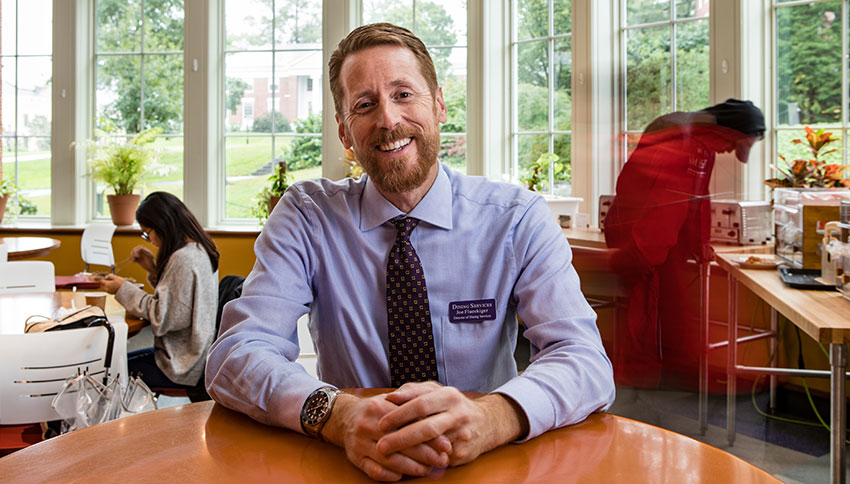
If you’ve been in Valentine, you’ve seen him. He’s a warm presence, but also a watchful one, gliding purposefully around the floor of the dining hall.
He’s Joe Flueckiger, Amherst’s director of Dining Services, and he’s a man on a mission.
In his first year, he has helped lead Amherst in a double charge: to improve the sustainability of its on-campus food system and to ensure that Val’s menus align with the changing needs of Amherst’s students.
Valentine’s fall menus are designed to accommodate an undergraduate population that is eating less bread and is more interested in plant-based diets. According to a 2018 Dining Services survey, 25 percent of today’s Amherst students are vegetarian. Ten percent identify as vegan, a number that far exceeds the national rate of 1 percent.
“Students want healthier options, they want more local food, they want sustainability criteria to be met, and they are interested in food justice issues,” says Flueckiger. “They care about how food affects the environment and the economy. And they want their pizza and fries. We’re trying to balance all those things in a way that makes sense in our current moment.”
Val now serves only antibiotic-free chicken. Gone is the custom smoothie station—it was a hazard for those with food allergies—but premixed smoothies can be customized with add-ins such as protein powder, wheat germ, chia seeds and spirulina.
The plastic cereal dispensers, which once occupied prime real estate in the center of the main serving area, have been relocated to make way for less sugary offerings. As Flueckiger notes, “A big, beautiful display of fresh fruit is a much more inviting way to enter the space where we’re serving the food we care about.”
Flueckiger came to Amherst after 25 years in management at Whole Foods, Northampton’s River Valley Co-op, the UMass Dining Commons and the Kripalu Center for Yoga & Health. His arrival on campus coincided with the disappearance of the hundreds of folded paper “table tents” that used to litter the dining tables. Flueckiger had those corralled into display cubes, which can be disinfected. (As a bonus, they also require less paper than the old tents.)
Some students objected when he relegated the tabletop salt and pepper shakers to the spice stations. “We create and test recipes,” Flueckiger explains. “We’re not going to deny anyone their salt. We just encourage people to taste the food and then salt with intention.”
Val officially went trayless this semester, because trays tend to encourage food waste. Under Flueckiger’s leadership, Val has also improved its methods for tracking waste and began moving away from products that do not have compostable packaging. He praises his colleagues for how they have coordinated efforts to develop a more sustainable food system.
For those colleagues, Flueckiger has promoted a culture of “skills development, training and encouraging staff to reach higher,” notes Jim Brassord, chief of campus operations. Nine employees have been promoted to more senior positions within Dining Services in recent months.
This year, with support from the Kendall Foundation, Dining Services will maximize the food it purchases from New England suppliers. It will also launch a campaign to inform students of the benefits of local food.
But the sustainability messaging goes both ways, Flueckiger insists. ”Here, the student population drives a lot of the innovation, which I find very compelling,” he says. In his short time at Amherst, he has welcomed the students who approach him with ideas to improve or study operations in Val.
“We need to respond to students in order to remain relevant,” says Flueckiger. “This food system is alive and it’s changing.”
One thing that doesn’t change is the sense of comfort and community that Dining Services aims to create for students each day. “Food is something to celebrate,” he says. “I think it’s important that we make it special every time.”